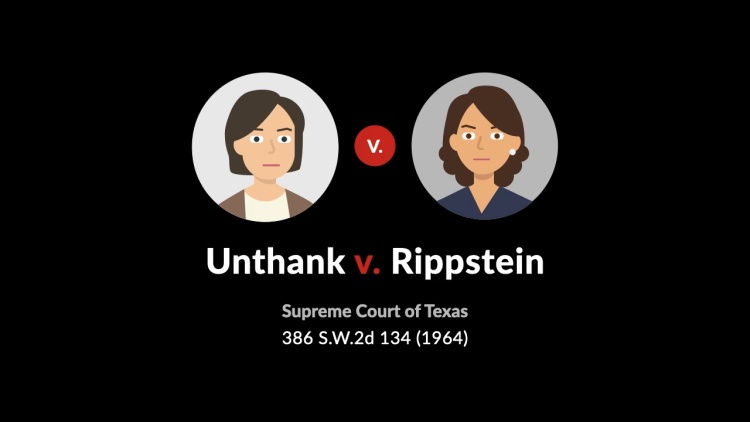Unthank v. Rippstein
Supreme Court of Texas
386 S.W.2d 134 (1964)

- Written by Christine Raino, JD
Facts
C.P. Craft wrote a letter to Iva Rippstein (plaintiff) three days before he died. His letter stated that he had decided to send Rippstein $200 monthly for five years “provided I live that long.” In the margin next to this statement, Craft wrote that he had stricken “provided I live that long” intending to “hereby and herewith bind my estate to make the $200.00 monthly payments.” After Rippstein unsuccessfully attempted to probate the letter as a holographic codicil to Craft’s will, she brought an action against the executors of Craft’s estate (defendants) for the monthly payments that would have already been due, and sought a declaratory judgment decreeing the executors’ obligation to make future payments consistent with the instructions in the letter. After the trial court granted summary judgment in favor of the executors, the Court of Civil Appeals reversed and held in favor of Rippstein that the letter had established a trust that bound the portion of Craft’s estate needed to make the promised payments. The executors of Craft’s estate appealed to the Supreme Court of Texas. Rippstein asserted in defense that the notation in Craft’s letter imposed a trust on his entire estate in order to make the promised payments and that the portion not needed to make the payments automatically reverted to Craft.
Rule of Law
Issue
Holding and Reasoning (Steakley, J.)
What to do next…
Here's why 907,000 law students have relied on our case briefs:
- Written by law professors and practitioners, not other law students. 47,100 briefs, keyed to 996 casebooks. Top-notch customer support.
- The right amount of information, includes the facts, issues, rule of law, holding and reasoning, and any concurrences and dissents.
- Access in your classes, works on your mobile and tablet. Massive library of related video lessons and high quality multiple-choice questions.
- Easy to use, uniform format for every case brief. Written in plain English, not in legalese. Our briefs summarize and simplify; they don’t just repeat the court’s language.





